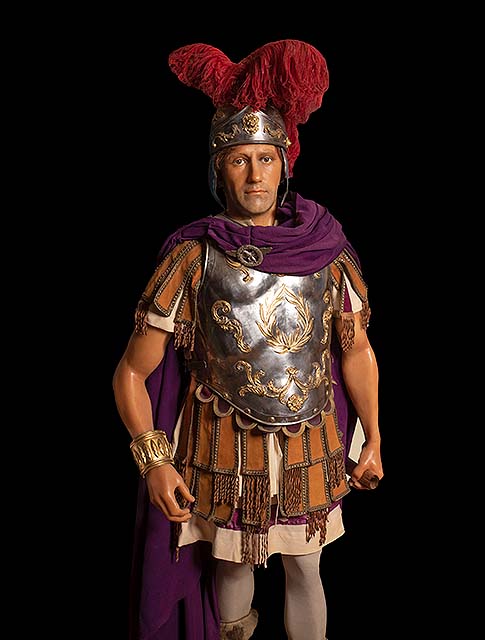Mark Antony of Rome’s Biography
Mark Antony’s biography notes that he was an iconic figure in ancient Rome, playing a crucial role in the development of Roman history and the unruly era of the late Roman Republic. Antony was born in 83 BCE as Marcus Antonius but is known historically as Mark Antony. He was an influential military leader and politician whose rise to prominence left an enduring impression on the annals of Roman history.
Antony’s historical significance can be traced back to his association with Julius Caesar, one of the most influential leaders of ancient Rome. Mark Antony served as a military officer under Caesar, ultimately gaining Caesar’s trust through his military expertise. Eventually, Mark Antony became a part of the Second Triumvirate alongside Caesar’s heir, Octavian.
Mark Antony’s personal life was detrimental to Rome’s political landscape. When he pursued Cleopatra, Queen of Egypt, he was still married to his fourth wife and Octavian’s sister, Octavia. Leaving Octavia for his union with Cleopatra became a legendary anecdote of ancient Rome, as the consequences of his new relationship caused military and political conflict, which led to the naval Battle of Actium in 31 BCE. Octavian defeated Antony, which not only ended his political aspirations but also resulted in the deaths of both Mark Antony and Cleopatra.
Mark Antony’s role in Roman history is a tale of ambition, political maneuvering, and the delicate web of personal relationships and politics. His legacy continues to be a subject of fascination, with historians and literary figures alike delving into the complexities of his character and the dramatic events that unfolded during his time in ancient Rome.
DID YOU KNOW?
Mark Antony's role in Roman history is a tale of ambition, political maneuvering, and the delicate web of personal relationships and politics.
Early Years of Mark Antony
Mark Antony’s early life began with his birth in Rome in 83 BCE. He experienced a childhood marked by the political upheavals and societal transformations of the late Roman Republic. Little is known about his early years, but his family background held political significance. Antony was from a distinguished Roman family with ties to the political elite. His father, Marcus Antonius Creticus, was a supporter of the populist politician Marius.
In his youth, Antony demonstrated an interest in a military career, which would come to define much of his life. He entered public service and served under Aulus Gabinius in campaigns in the eastern provinces, gaining valuable military experience that would prove crucial in his later years. It was during these early military assignments that Antony began to cultivate the skills and leadership qualities that would propel him to prominence.
As the political landscape of Rome underwent tumultuous changes, Antony’s association with influential figures like Julius Caesar became crucial for the direction of his future. His early experiences in the military and exposure to the intricate world of Roman politics laid the foundation for the charismatic and ambitious figure who would later play a central role in the events leading to the demise of the Roman Republic.
Personal Life of Mark Antony
Born into aristocracy, Mark Antony faced early challenges, such as losing his father and growing up with limited parental guidance. His lack of direction led him to a promiscuous lifestyle that resulted in substantial debts.
From an early age, Antony showcased remarkable military and oratorical talents, earning him recognition in Roman society.
Antony’s personal life was marked by a series of marriages, reflecting his complex relationships. His unions with Fadia, Antonia, Fulvia, Octavia, and Cleopatra unfolded against a backdrop of political turmoil and shifting alliances. His marriage to Cleopatra, the famed queen of Egypt, became a defining chapter in his life, with their love affair contributing to his ultimate downfall.
Antony’s family life was abundant, with various children from his five marriages. With Fadia, he had several offspring, while Antonia bore him a daughter. Fulvia gave him two sons, and Octavia added two daughters to his lineage. Cleopatra, with whom he shared a passionate romance, brought into the world two sons and a daughter.
Antony’s familial connections extended beyond Rome, linking him to three Roman emperors — Caligula, Claudius, and Nero — through his daughters with Octavia. Additionally, his daughter Cleopatra Selene tied him to the Mauretanian royal family, highlighting the intricate tapestry of his personal and political affiliations.
DID YOU KNOW?
Antony's family life was abundant, with various children from his five marriages.
Interesting Facts About Mark Antony
Marcus Antonius, known as Mark Antony, was born on January 14, 83 BCE, in Rome, to Marcus Antonius Creticus and Julia Antonia.
Despite his maternal connection to Julius Caesar, marking him as a member of the Julia gens, Antony’s status was plebeian.
His early years were marked by hardship, as his father’s death and his mother’s second husband’s financial misfortune left Antony and his brothers on the streets of Rome.
In 57 BCE, Antony embarked on a lifelong military career, remaining in the army until the end of his days.
His marriages, governed by both Roman and Egyptian law, included unions with four Roman women and Cleopatra, sealing an alliance with Octavian through his marriage to Octavia in 40 BCE.
As a plebeian, Antony assumed the office of “Tribune of the Plebs” in 49 BCE, but swift expulsion from Rome followed a week later.
Mark Antony was appointed governor of Italy when Caesar became Dictator for Life in 48 BC.
Antony’s oratory skills shone during Caesar’s funeral, inciting a riot that forced Brutus and Cassius to flee.
Family played a significant role in Antony’s life, with five children from Roman marriages and three from Cleopatra.
The fate of his sons with Cleopatra remains unclear, but his daughter, Cleopatra Selene, married King Juba II of Numidia.
Mark Antony, owing to his plebeian background, fostered strong connections with his troops.
His political choices, such as ordering Cicero’s death in 43 BCE, showcased the complexity of his character.
In a tragic end, Antony and Cleopatra chose suicide in Alexandria, with Antony opting for the traditional Roman method of impaling himself with a gladius sword, while Cleopatra either ingested poison or succumbed to a snakebite.
Mark Antony's Greatest Accomplishments in Ancient Rome
Mark Antony was a key figure in Roman history. He was a member of the Second Triumvirate alongside Octavian and Lepidus. Antony’s role was crucial in overseeing the empire, with his influence extending far and wide. This allowed Antony to gain control over the eastern provinces, which contained a significant part of Egypt.
His alliance with Julius Caesar further solidified his position as a formidable general, actively participating in the conquest of Gaul and navigating the complexities of the ensuing civil war.
Antony’s connection with the queen of Egypt, Cleopatra, went beyond political alliances. The union resulted in children, adding a personal dimension to the intricate tapestry of Roman politics.
Antony held a significant political-religious role as a member of the College of the Augurs, showcasing his multifaceted influence on Roman governance.
His role in transforming Rome from a republic to an empire marked a critical juncture in the history of the ancient city.
Civil War and Triumvirate
Mark Antony played a pivotal role in the events that shaped the future of the Roman Republic: the Roman civil war and the formation of the Second Triumvirate. In the aftermath of Julius Caesar’s assassination in 44 BCE, political turmoil erupted, leading to a power struggle between Caesar’s supporters and those seeking to uphold the traditional republic. Antony, aligning himself with Octavian and Lepidus, formed the Second Triumvirate in 43 BCE. Together, they aimed to restore order and avenge Caesar’s death.
The three men emerged victorious in the brutal battles of Philippi in 42 BCE, defeating the forces of Brutus and Cassius, the principal conspirators against Caesar. However, internal conflicts and power struggles within the Second Triumvirate soon emerged, foreshadowing the eventual end of this political alliance and setting the stage for the transformation of Rome into an empire.
DID YOU KNOW?
Antony, along with Octavian and Lepidus, formed the Second Triumvirate in 43 BCE.
Death of Mark Antony
Facing defeat by Octavian in the Battle of Actium in 31 BCE, and surrounded by political and personal turmoil, Antony’s life met a tragic end when he opted to die by the tradition of Roman soldiers. According to historical accounts, Antony committed suicide by impaling himself with his sword.
The circumstances leading to his death were influenced by his relationship with Cleopatra, the queen of Egypt. Cleopatra and Mark Antony’s alliance was detrimental. Antony’s death marked the end of an era, symbolizing the fall of the Roman Republic and the rise of the Roman Empire under Octavian’s rule.
FAQs
What was Mark Antony famous for?
Mark Antony was famous for his role in Roman politics, military campaigns, and his relationship with Cleopatra, making him a memorable figure in ancient Roman history.
How did Mark Antony die?
Mark Antony died by suicide in 30 BCE in Alexandria, Egypt. His suicide was a dramatic and quintessentially Roman act, allegedly using the traditional Roman method of impaling himself with his gladius sword.
What was Mark Antony’s family like?
Mark Antony had five marriages and multiple alliances, reflecting ancient Rome’s intricate political and personal relationships.
How did Mark Antony come to power?
Mark Antony rose to power through military accomplishments, political maneuvering, and strategic alliances.
What was Mark Antony’s relationship with Cleopatra?
Mark Antony’s relationship with Cleopatra was a political and romantic alliance between Rome and Egypt.










